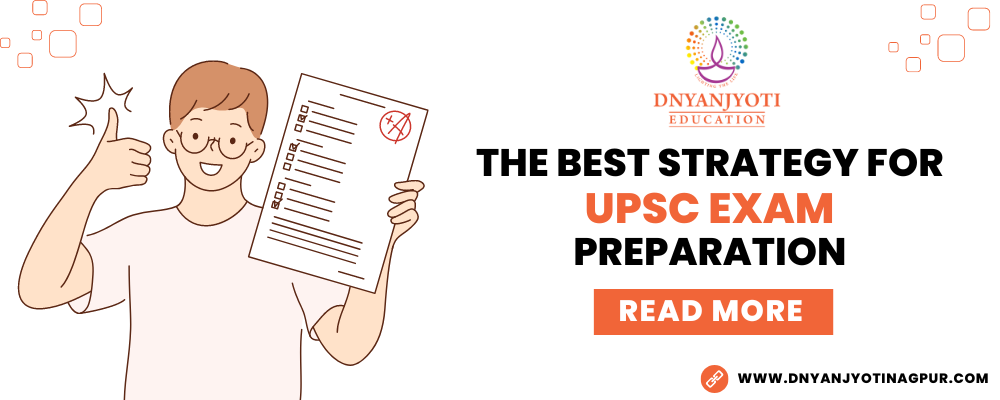Strategy For UPSC
The IAS exam, also known as the UPSC civil services exam, is a combination of Right Knowledge and Right Strategy for UPSC exam. While you should prepare the topics in the UPSC syllabus thoroughly, you should also acquire a few skills to perform well on the IAS exam. IAS exams have unique demands, so you can only succeed with a focused, planned, and guided preparation. You should always keep in mind that your primary goal when preparing for the IAS exam should be to clear the exam, not to acquire knowledge about a particular subject.
University study should aim for knowledge, whereas IAS study should solely aim for clearing the UPSC exam. Your performance and preparation will be greatly enhanced if you have this attitude and focus.
It is important to understand the structure of the IAS exam before beginning the preparation process.
IAS Exam Pattern
UPSC exams are divided into three stages. Stages must be cleared before moving on to the next. There is a drastic reduction in the number of candidates at every stage. Civil service candidates often take the first stage and then, at the end, about 700 – 1000 are selected.
The UPSC strategy is therefore crucial for the candidates to clear the exam.
The first stage is the preliminary exam
In this stage, there are two objective types of papers, General Studies I and General Studies II (CSAT).
Click on the link below to get more information about these prelims papers:
Civil Services (Preliminary) Exam – UPSC Prelims 2023 Syllabus – Books, Syllabus, Strategy
The second stage is the mains
Nine descriptive papers are part of this stage.
Find UPSC mains exam pattern, papers, syllabus, and dates in the linked article.
UPSC Mains Exam Pattern
| Paper | Subject | Nature of the paper | Duration of exam | Marks |
| Paper A | Compulsory Indian Language | Qualifying | 3 hours | 300 |
| Paper B | Compulsory English Language | Qualifying | 3 hours | 300 |
| Paper I | Essay | Merit ranking | 3 hours | 250 |
| Paper II | General Studies I | Merit ranking | 3 hours | 250 |
| Paper III | General Studies II | Merit ranking | 3 hours | 250 |
| Paper IV | General Studies III | Merit ranking | 3 hours | 250 |
| Paper V | General Studies IV | Merit ranking | 3 hours | 250 |
| Paper VI | Optional Paper I | Merit ranking | 3 hours | 250 |
| Paper VII | Optional Paper II | Merit ranking | 3 hours | 250 |
The third stage is the personality test
The UPSC board interview takes place during this stage.
Aspirants can review the UPSC Notification for more information about the different posts of the CSE Exam and to download the UPSC Notification to gain a better understanding of the exam requirements by looking at the above three stages of the UPSC CSE Exam.
Tips to Improve UPSC Preparation Strategy
The following tips and insights can help an aspirant improve his or her preparation strategy for the UPSC Exam.
Become familiar with the UPSC exam pattern and understand the needs and expectations of the UPSC Exam at three different levels. It will depend on the level of the UPSC Exam what preparation strategy you will use. For instance, the prelims level of the exam assesses the candidates’ knowledge and analytical skills. While in the mains level, descriptive knowledge of each topic is necessary, which is not necessary in the preliminary level.
When you read the newspaper every day, you will have an edge over candidates who don’t regularly follow news updates.
The knowledge base should be developed from the basics up. Basic information can be found in the NCERT books.
Identify your strengths and weaknesses by answering many MCQ type questions. In order to prepare for IAS, it is important to focus on strengthening the strong areas and improving the weaker ones.
In the UPSC, notes making is an art due to the vastness of the syllabus. In the end, the notes became very confusing and unorganized because of their large volume. It is also important for candidates to minimize the amount of time they spend writing notes for everything. Organizing the notes is the best strategy for UPSC exam , otherwise, revision will again take a lot of time. See the linked article to learn more about Making Notes For UPSC IAS Exam.
Consistency is key to UPSC Success – Prepare every day with the same level of dedication and commitment and treat every day the same.
How can Dnyanjyoti Education Nagpur Free IAS Prep help you with IAS preparation?
| Comprehensive daily news analysis | Analysis of PIB Releases for UPSC |
| All India Radio(AIR) NEWS Discussions | Daily video analysis of The Sansad Tv |
The following tips can assist aspirants in taking advantage of BYJU’s various initiatives. A few useful links are provided below.
UPSC Syllabus
As part of the preparation for UPSC, the syllabus is of utmost importance. Before starting your preparation, make sure you have thoroughly reviewed the syllabus.
Know More About UPSC Syllabus.
IAS Books
After reviewing the syllabus, you should compile a list of IAS study materials. A good place to start is with NCERT books because they contain material in a very simple language. Once you have completed the basic UPSC preparation books, you can move on to the advanced ones.
| Class | Textbooks |
| 6th | History: Our Past Geography: The Earth Our Habitat Social Science: Social & Political Life I Science: Science: Class VI |
| 7th | History: Our Past – II Geography: Our Environment Social Science: Social & Political Life II Science: Science – Class VII |
| 8th | History: Our Past III – Part I & II Geography: Resource and Development Social Science: Social & Political Life III Science: Science – Class VIII |
| 9th | History: India and the Contemporary World-I Geography: Contemporary India – I Political Science: Democratic Politics Part – I Science: Class IX Economics: Economics |
| 10th | History: India and the Contemporary World – II Geography: Contemporary India – II Political Science: Democratic Politics Part – II Science: Class X Economics: Understanding Economic Development |
| 11th | History: Themes in World History Geography: Fundamentals Of Physical Geography, India- Physical Environment Science: Chemistry: Unit 14, Biology: Unit 4 & 5 Economics: Indian Economic Development Sociology: Understanding Society Political Science: Indian Constitution at Work Indian Culture: An Introduction to Indian Art, Living Craft Traditions of India (Chapters 9 & 10) |
| 12th | History: Themes in Indian History Geography: Fundamentals Of Human Geography, India – People & Economy Science: Chemistry: Unit , 16 Biology: Unit 8, 9 & 10 Economics: Introductory Macroeconomics Sociology: Indian Society, Social Change and Development in India Political Science: Contemporary World Politics |
The linked article contains the complete list of NCERT books needed for UPSC preparation.
Important tips for IAS Preparation
Plan your preparation and stick to it. The exam is a long process that requires you to stay motivated and cover portions of the syllabus on time.
Revision is of utmost importance. A large syllabus and multiple subjects make it hard for you to remember what you have learned. If you want to remember everything you learned, you should revise repeatedly and regularly.
Since the exam assesses you on what you write, rather than what you know, you should practice answering questions.
For this, you should register for both a prelims and a mains test series. Test series can help you avoid negative marking in the preliminary exam and teach you how to make intelligent guesses.
Test series are essential for the mains exam since candidates generally cannot complete the paper. The time it takes to write a single answer is approximately 7 minutes, so you will need to practice a lot.
Current affairs should be a part of your IAS preparation, as this is the crux of the UPSC civil services examination. It is no easy task because you have to scan the newspapers daily to stay on top of the latest national and international news. It is our goal to make this process easier for you. Take a look at the next section to learn more about what we offer.
In preparation for the UPSC IAS exam, Must Visit Dnyanjyoti Education Nagpur


